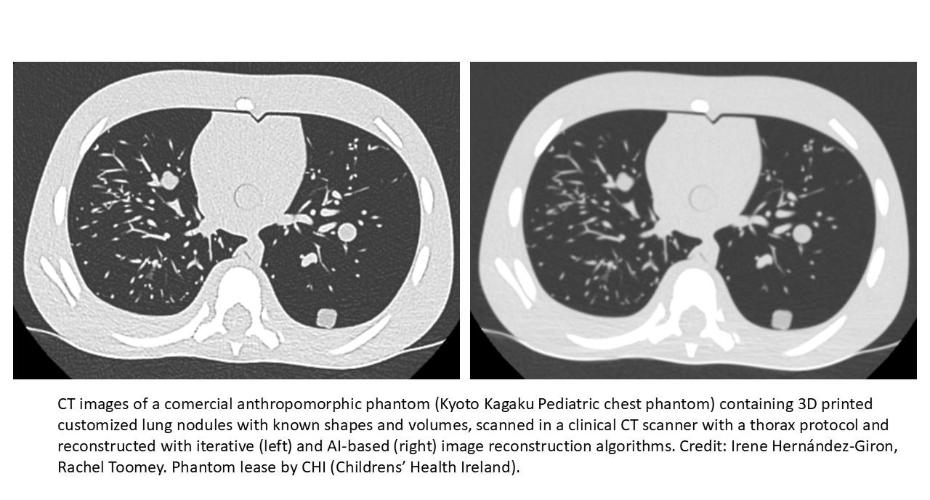Computed Tomography (CT) has a wide range of clinical applications including detection of abnormalities, guiding interventional/therapeutic procedures and monitoring therapeutic response. Over 400,000 CTs are carried out annually in Ireland and this number is rapidly increasing. CT accounts for >60% of the collective radiation dose from medical imaging nationally. Exposure to ionising radiation is associated with increased risk of cancer.

CT imaging involves an X-ray tube and detector acquiring images from many different angles, and the data is reconstructed to provide a 3D dataset. New developments in Artificial Intelligence (AI) based image reconstruction promise improved image quality at lower radiation doses in CT. However, details on how these packages are trained / how representative training is of patient cohorts are protected, and tools also vary between vendors and even between anatomical areas. This creates challenges in understanding the clinical impact on diagnosis and also in validating the efficacy of these models during testing and clinical use. AI reconstruction evaluation might be incompatible with test phantoms traditionally used for assessing image quality. In addition, physical metrics of image quality are not necessarily correlated directly with improved diagnostic accuracy; the relationship between physical image quality, perceived image quality and diagnostic accuracy is a complex one. Better understanding of how AI reconstruction impacts the perception of CT images for diagnosis is required to ensure safe adoption. Finally, AI algorithms can only be used optimally if medical imaging professionals understand them and are educated in their safe operation. Radiographers and physicists need to know how to evaluate and apply these tools in specific clinical situations.
The aim of the network is to investigate from a multidisciplinary and interprofessional perspective the impact of AI reconstruction on CT imaging, ensuring that the entire imaging chain is considered. It also aims to build a national network of physicists, radiographers and radiologists to progress research and education on AI in CT across Ireland, and ultimately improve outcomes in clinical practice.
Rachel Toomey is a registered diagnostic radiographer and an Assistant Professor in Radiography & Diagnostic Imaging, UCD School of Medicine. Her research interests include medical image perception and display, image optimisation and One Health approaches. She has extensive experience in the performance and supervision of medical image perception and observer performance studies.
Irene Hernandez Giron is an expert in diagnostic imaging and image quality optimization. Irene develops anthropomorphic models manufactured using 3D printing selecting tissue-equivalent materials for X-ray and CT imaging. and also focuses on Artificial Intelligence perception of diagnostic images. Irene is a member of a variety of international bodies and working groups including the European Federation of Organisations for Medical Physics (EFOMP Scientific Committee) and Working Group for the Curriculum on Artificial Intelligence for Medical Physicists.
Dr. Seán Cournane is Principal Physicist in St Vincent’s University Hospital and a registered Medical Physics Expert (MPE). In addition to his considerable expertise in medical imaging physics and analysis, Sean is a member of St. Vincent’s Healthcare Group Research Ethics Committee (REC) and will provide guidance on ethical aspects of the project. He is the Director of UCD’s Centre for Physics in Health and Medicine where he conducts research and supervises MSc and PhD researchers.
Mr. Ronan Coleman is a Senior Physicist in St. James’ Hospital and an MPE who has published on image quality analysis, Ronan is the Group Convenor for the Irish Association of Physicists in Medicine (IAPM)’s Artificial Intelligence Special Interest Group (AISIG), and has extensive computational knowledge and expertise. He has worked as a Health Informatics and Data Analyst and recently won the IAPM Early Stage Research Award for his development of ‘Scorim’, a new web-based platform for use in medical image perception studies.
Ms. Edel Thomas is an experienced radiographer, specialised in CT imaging. She is Programme Director of the Masters Degree in CT in UCD as well as contributing to undergraduate education on the topic. She has set up and leads the UCD CT Academy for radiographers. She has authored versions of the Irish Institute of Radiography and Radiation therapy (IIRRT) Best Practice Guidelines for CT and has published on the use of machine learning for vetting of CT referrals. She is a member of the AI in Radiography working group in UCD and a professional member of CORU, IIRRT, EFRS, ESR and CT Users Group.
UCD Institute for Discovery
O'Brien Centre for Science, Belfield, Dublin, Ireland. E: discovery@ucd.ie | Location Map(opens in a new window)www.ucd.ie/discovery